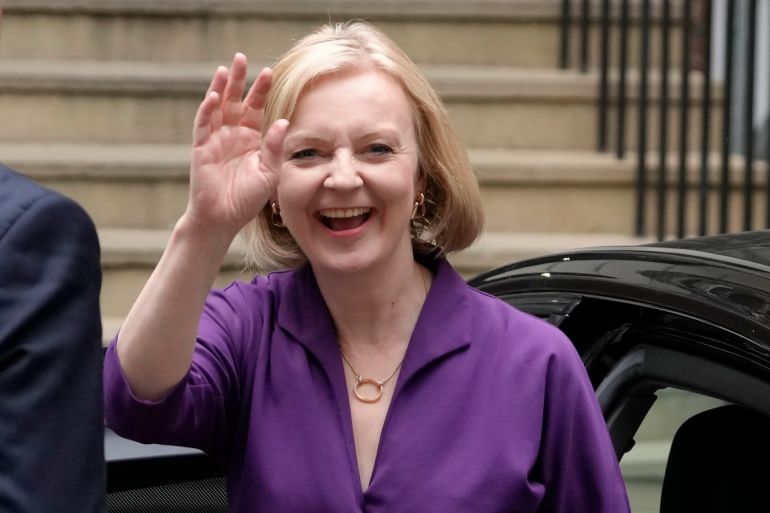Truss gets to the top of the greasy pole
As the next prime minister, Liz Truss has little time or support from Conservative MPs to turn things around for the UK.

The United Kingdom is about to have a new prime minister. She will be Elizabeth “Liz” Truss, the current foreign secretary, and she is taking over from Boris Johnson.
In some ways, this is not constitutionally or historically unusual. Several previous foreign secretaries have taken over as prime minister, such as Anthony Eden (1955), Alec Douglas-Home (1963), James Callaghan (1976) and John Major (1990). Johnson himself was foreign secretary from 2016 to 2018. Indeed, the post of foreign secretary is often regarded as the most prestigious and senior role in the British government after the prime ministership.
Keep reading
list of 4 itemsHaiti Prime Minister Ariel Henry resigns, transitional council takes power
Spain prosecutor seeks dismissal of corruption case against Sanchez’s wife
Over 100 students arrested in California, Texas as Gaza protests intensify
It is also not unusual for the prime minister to change without a general election. Since 1974, every single British prime minister has either come into office or left office between general elections, with the last two — Theresa May and Johnson — doing both.
What is, however, unusual is the manner of this change at the top. More importantly, many of the challenges that Johnson struggled against politically in recent months could also haunt Truss.
On the face of it, Johnson was in a strong position. He had called and won a general election in 2019 which gave his government a substantial majority. He “got Brexit done” — although that was by the messy expedient of agreeing to a withdrawal agreement that had been previously rejected and is now causing complications with its Northern Irish protocol.
This summer, however, his government imploded. Dozens of ministers suddenly resigned. The cause of this political drama was that his colleagues, in effect, lost confidence in his leadership. In particular, they did not know whether a position they took in parliament or in front of the media one day would be compromised by the government the next day. Johnson, who is currently being formally investigated for misleading the House of Commons about the Downing Street parties during the COVID-19 lockdown, was seen as not a friend either of the truth or of the careers of his colleagues.
That this — and not any matter of grand policy or high political principle — was the reason for his sudden departure is significant. Although the new prime minister will have to deal with problems to do with Brexit, the ongoing cost-of-living crisis and the escalating energy price crisis, none of these matters was directly the cause of Johnson’s downfall and Truss’s elevation.
It is the means of her elevation which may point to what happens next politically. Here it must be noted that Truss is not especially popular with her backbenchers. Only 50 out of 358 Conservative members of parliament (MPs) voted for her in the first round of the leadership contest. Her ministerial record, although long, is pretty vacant of any accomplishments.
In the final round of voting by MPs, she still was behind former Chancellor Rishi Sunak among her colleagues. That she got on the shortlist of two candidates to go to the national party vote was not inevitable.
Truss has won by appealing to Conservative Party members, who may not be representative of Conservative voters more broadly, and are certainly not representative of the electorate in general. Although she may now break free of any sense of political obligation towards those who voted for her, it is more likely that she will govern from a partisan perspective with a like-minded cabinet, and with economic policies that make little sense. If so, this may be the most partisan British government of modern times, at least in tone if not substantive policy.
With the United Kingdom heading towards another general election, she has limited time, until December 2024, to make any political impression. In the meantime, any controversial legislation — especially if not covered by the Conservative’s 2019 manifesto — may get stuck in the upper chamber of parliament, the House of Lords. Strident words may not have time to become striking achievements.
This would be a challenging time for any prime minister. Given how low her support is with her party’s MPs and the limited time left before the next election, Truss is in an especially difficult position. A lot of noise can be made, of course, but little progress. If Truss leads her party to defeat in the next general election, as is predicted by opinion polls, she will join other prime ministers who, having taken over mid-term, went on to be defeated, such as Callaghan (1979) and Gordon Brown (2010). That would not be unusual.
To be sure, one should never underestimate any politician who climbs to the top of what Victorian statesman Benjamin Disraeli called “the greasy pole”. Truss has managed to become prime minister, while hundreds of her contemporary politicians have not.
The signs are not good for a successful Truss premiership, or for her party at the next general election. Truss is the UK’s fourth prime minister since the Brexit referendum, just over six years, and we may soon be on our fifth after the next election.
Yet, more unusual things have happened in British politics in recent years than a successful Truss premiership, and so all one can say confidently is that the next two or so years will be as politically interesting as the last six or seven.
The views expressed in this article are the author’s own and do not necessarily reflect Al Jazeera’s editorial stance.
